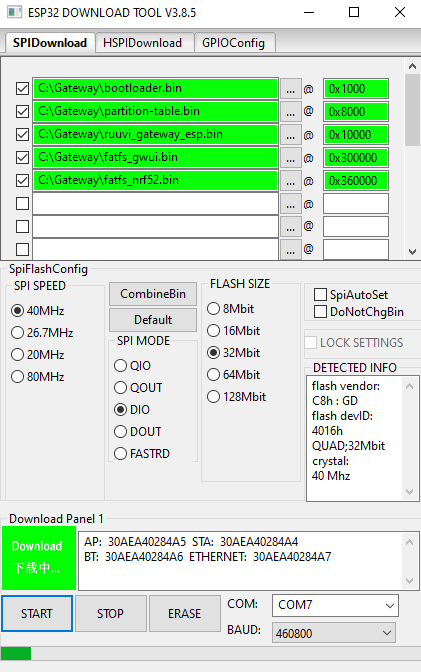Developed with:
- ESP-IDF version v4.0.1
- ESP32-DevKitC V4
- Waveshare LAN8720 ETH board
- nRF52832 devkit
or Ruuvi Gateway A1 boards, contact lauri@ruuvi.com for details on how to get one.
Latest documentation and roadmap is at https://docs.ruuvi.com/gw-esp32-firmware .
| ESP32 | Function |
|---|---|
| GPIO35 | Reset button |
| 4 | UART TX |
| 5 | UART RX |
| ESP32 | nRF52832 devkit | Function |
|---|---|---|
| GPIO5 | P0.11 | UART: ESP -> NRF |
| GPIO36 | P0.31 | UART: NRF -> ESP |
| GPIO15 | Debug In: 4 | SWD CLK |
| GPIO16 | Debug In: 2 | SWD I/O |
| GPIO17 | Debug In: 10 | SWD NRST |
| 3V3 | Debug In: 1 | VCC +3.3V |
| GND | Debug In: 3 | GND |
| ESP32 | LAN87210 |
|---|---|
| 0 | nINT/REFCLK |
| 23 | NC/CLOCK_ENABLE* |
| 15 | MDC |
| 18 | MDIO |
| 19 | TX0 |
| 21 | TX_EN |
| 22 | TX1 |
| 25 | RX0 |
| 26 | RX1 |
| 27 | CRS/RX_DV |
** ESP32 will use external clock signal from LAN8720 and some modifications are needed for that: **
- WaveShare LAN8720 modification for clock
- Remove capacitor C15 from onboard Boot button (SW1) to make clock signal work from LAN8720
nRF52 firmware can run on PCA10040/nRF52832 or on nRF52811 on Ruuvi Gateway. You can find the latest firmware at https://github.com/ruuvi/ruuvi.gateway_nrf.c.
Run git submodule update --init --recursive to get updated components.
Project configuration is stored in sdkconfig-file, you don't need to reconfigure it.
Build the project and flash it to the board, then run monitor tool to view serial output:
idf.py build
idf.py -p PORT flash monitor
(To exit the serial monitor, type Ctrl-].)
See the Getting Started Guide for full steps to configure and use ESP-IDF to build projects. Please note that you need to install specific ESP-IDF version, current version is at the top of the README. For example git clone -b v4.0.1 --recursive git@github.com:espressif/esp-idf.git
Prebuilt images for development versions of firmware can be found at Ruuvi Jenkins. However these are artifacts of internal development, if you want to just use the gateway you should use release starting from 1.x+. First release is estimated to be ready on 7/2020.
You can flash them with esptool.py
pip install esptool
esptool.py -p (PORT) -b 460800 --before default_reset --after hard_reset write_flash --flash_mode dio --flash_size detect --flash_freq 40m 0x1000 bootloader.bin 0x8000 partition-table.bin 0x10000 ruuvi_gateway_esp.bin 0x300000 fatfs_gwui.bin 0x360000 fatfs_nrf52.bin
or using the Windows GUI tool Flash Download Tools (download) with these settings:
